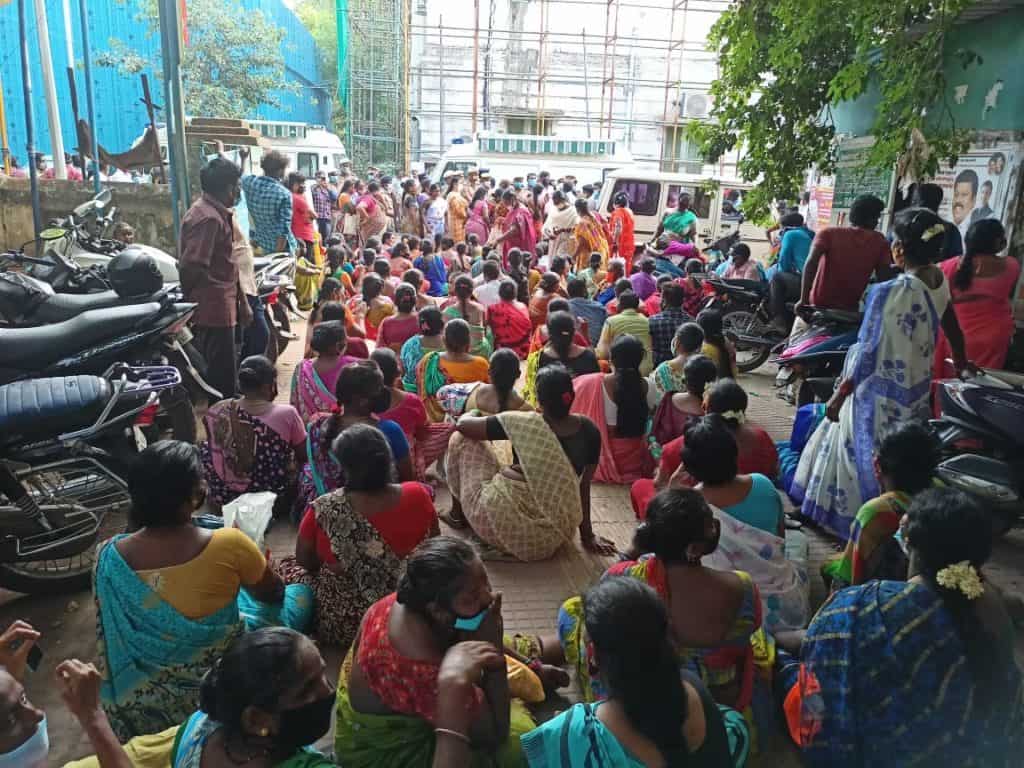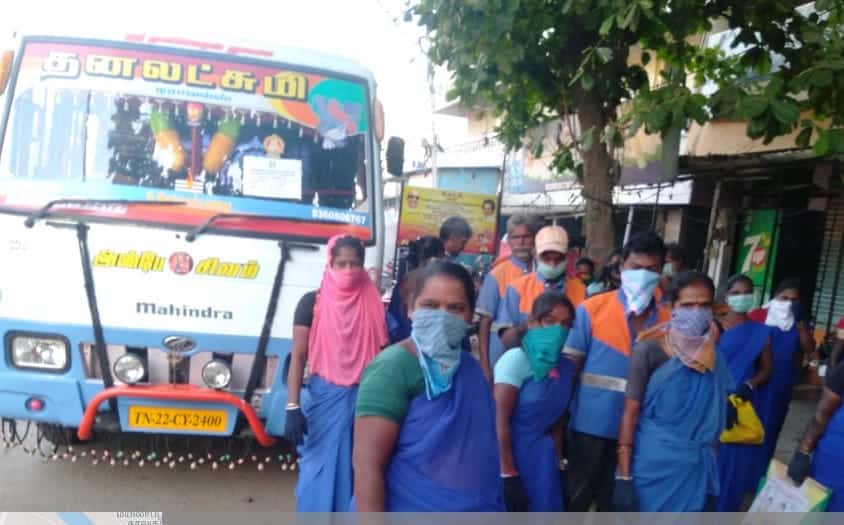With house rent of Rs 6,000 overdue and two children on the verge of dropping out from school due to her inability to arrange for fees, single mother R Sharmila is at the end of her tether. She is one of the hundreds of conservancy workers who were terminated by the Greater Chennai Corporation (GCC), without any prior notice, earlier this year. In January, the civic body suspended the contract of 545 conservancy workers after the privatisation of 11 of the 15 zones in Chennai. Although they have been jobless for over six months now, the fired conservancy workers turn up at every protest that the unions organise, hoping to be re-employed.
Permanent vs temporary workers

According to S Purushothaman, an office-bearer of Bharatiya Mazdoor Sangh (BMS), a workers’ union, the Chennai Corporation has over 17,500 conservancy workers working across 250 wards in the city. Of them, more than 6,000 are permanent workers and 12,000 workers were hired through the National Urban Livelihoods Mission (NULM) scheme on a contract basis.
The NULM is a central government initiative that aims to reduce poverty and vulnerability of urban poor households by enabling access to self-employment/skilled wage employment opportunities for them. The aim is to bring about an improvement in their lives and livelihoods on a sustainable basis, by building strong grassroots level institutions of the poor. Under this scheme, various government agencies like the Corporation and Metro Water hire workers on a temporary basis.
“In January, 7,000 such temporary workers were suspended; of them, only 4,200 are have now found employment with Urbaser and Ramky, but the rest remain jobless. Workers above 50 years of age were terminated because of the age factor,” says Purushothaman.
According to P Srinivasalu, a leader in the Red Flag Union working for the welfare of the conservancy workers, the last time that the GCC hired permanent workers was in 2008, following which they resorted to hiring only contract workers. He adds that 1688 workers were made permanent in 2006 and 2203 workers in 2008.
Read more: Spare a thought for those who are risking their lives to keep the city clean
Permanent workers enjoy a host of benefits when compared to temporary workers. “A permanent worker’s basic salary is Rs 15700 and goes up to Rs 23000 when the benefits like Dearness Allowance (DA) are added. A permanent worker is eligible for additional benefits like pension, family health insurance and the likes,” adds Purushothaman. In contrast, the temporary workers earn around Rs 12,000 a month and have no job security.
Systemic flaws
“The corporation should take measures to formalise their jobs by registering these workers and should provide proper identity cards to preserve their rights and prevent them from getting exploited. Unfortunately, the corporation does not take initiatives to safeguard their rights and livelihood,” says a senior member of the Red Flag Union.
The member also points out that while the NULM talks of employment for the poor, there is nothing to ensure alternative livelihood opportunities for these workers if their contract gets terminated. Underlining how the local bodies should be onboarding them, the Ministry of Housing and Urban Affairs, in a case study, mentioned that the nature of contracts issued by the Municipalities in this context becomes crucial to ensure that the conditions are fair for the workers. It is also important that the workers understand what they are signing up for.
In reality, however, many of the terminated workers are unaware of the terms that they signed up for, which makes them more vulnerable to exploitation.
Plight of temporary workers
“I rely on the relief material that is distributed to us when we have union meetings. That is how all of us have been managing for the last six months. I have bought time from my house owner to pay the rent,” says Sharmila, the breadwinner of the family. Her alcohokic husband abandined the family and she is solely responsible for bringing up the children.
D Devi, yet another terminated worker, risked her health and life to earn her wages, even at the peak of the pandemic. Devi was among the conservancy workers who collected waste from COVID households when the caseload was very high. She was always punctual, reporting to duty at 6 am sharp, and says, “Whenever there were instances of other workers going on leave, I had to take on their tasks as well, extending my shifts”.

“Considering the workload we had taken on during disasters such as the COVID pandemic, Nivar cyclone, etc. I was really hoping to be made permanent soon. Instead, I was terminated without any notice. I was simply asked not to come back to work from the next day,” says the 32-year-old conservancy worker from Zone 6.
Devi’s salary was Rs 391 per day, which added up to Rs 11,800 every month. According to an order passed in 2017, the minimum wage stands at Rs 500 per day excluding various benefits. More than three years have gone by since the order was passed, but the civic body is yet to implement the wage revisions.
“The portfolio of temporary and permanent workers are the same. But while permanent workers receive salary in compliance with the minimum wages act and also receive additional benefits, temporary workers constantly live in the fear of being terminated,” Devi adds.
With three children, Devi used her salary to contribute to the family’s expenses to a large extent. Although her husband works as a painter, his earnings have taken a hit too due to the pandemic. “My first son dropped out of school. My second and third sons are in Classes 12 and 10, respectively. But they have not been able to attend the online classes, because I was unable to recharge the mobile phone,” she adds.
Having worked under the Corporation for over 10 years, Sharmila today fights to seek justice for the terminated workers.
“Many workers who have been terminated do not have any educational degree or skills to be eligible to take up other jobs. It is unfair to terminate contracts without notice. We are pinning our hopes on the ongoing case at the Madras High Court regarding our employment and wages,” she adds.
Devi recalls Tamil Nadu Chief Minister, M K Stalin’s promise of making them permanent early this year. “He even wrote a letter to the former CM, demanding intervention and job security for workers like us. But nothing has come out of it so far,” she says.
Read more: Who keeps your streets clean? The invisible women of singara Chennai
Key demands of protestors
When the terminated workers were hired ten years ago, the former government had stated that the contract of the workers would be extended on the condition that they report to duty for 180 consecutive days. The state labour laws call for granting permanent employment status upon completing 480 days of work. But with all these laws being flouted, the terminated workers find themselves at the crossroads.
In the past, the unions have made multiple representations to the civic body and state government with their pleas, which saw no concrete response. In 2019, the Red Flag Union sought judicial help by filing a petition in 2019 with the demands listed below:
1. Permanent employment status for terminated workers, and
2. Implementation of minimum wage of Rs 16,725 as mentioned in the labour laws
When Citizen Matters reached out to the Corporation to hear their thoughts on the issue, officials were guarded and refused to comment, citing an ongoing legal suit.